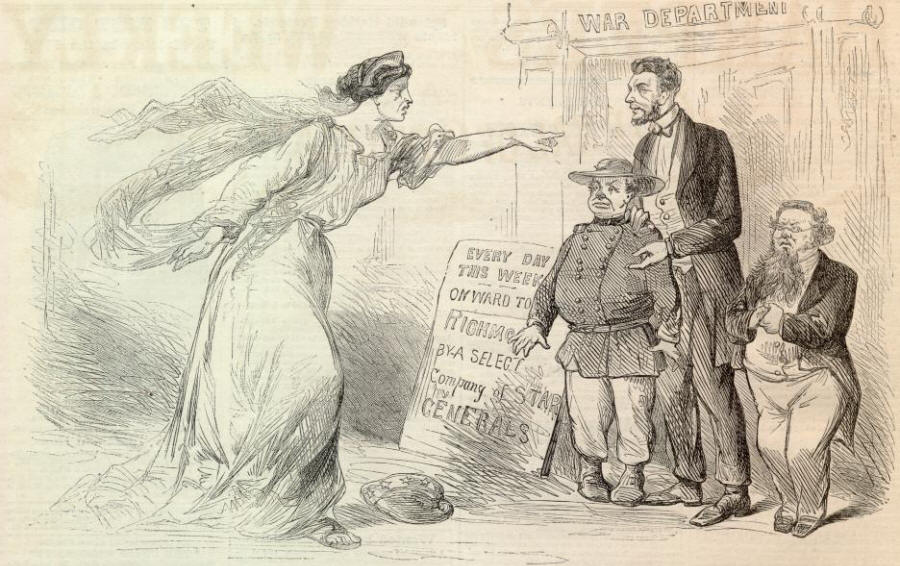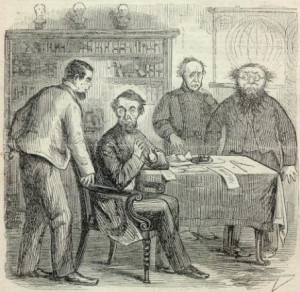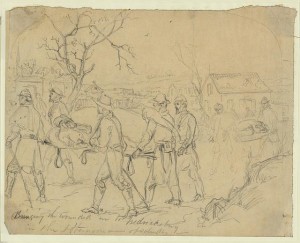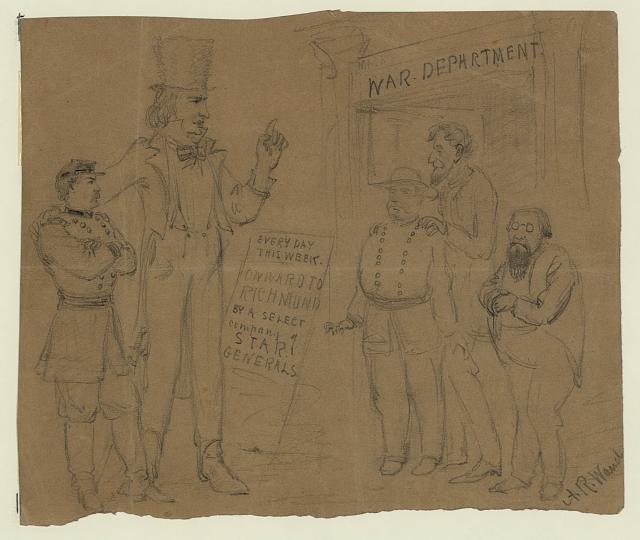
COLUMBIA. “Where are my 15,000 Sons—murdered at Fredericksburg?” LINCOLN. “This reminds me of a little Joke—” COLUMBIA. “Go tell your Joke AT SPRINGFIELD!!”
From a Seneca County, New York newspaper in December 1862:
Again Defeated.
What is to be said in this week of the nation’s agony? What word is sufficient in these days red with battle and hot with the flush of conflicting passions? Our arms have sustained another defeat, – more disastrous and ignominious than any which we have heretofore suffered.
The Grand Army under BURNSIDE in its triumphal march across the Rappahannock were but marching into the very jaws of death, as the sequel has most clearly demonstrated. The conspiracy which might have been crushed a twelve-month ago has now grown into proportions which overshadow the continent and threaten to destroy the nation. – And this because incapacity, treachery and weakness rule at Washington.

THOSE GUILLOTINES.—A LITTLE INCIDENT AT THE WHITE HOUSE. SERVANT. “If ye plase, Sir, them Gilliteens has arove.”
MR. LINCOLN. “All right, MICHAEL.—NOW, Gentlemen, will you be kind enough to step out in the Back Yard?”
The magnitude of the defeat on the heights of Fredericksburg cannot be fully comprehended, and it is sickening to contemplate the horrors of that terrible struggle. From an early hour until nightfall the slaughter went on without cessation, until the ruin of the Grand Army was complete, and well nigh twenty thousand brave and noble souls wet the hill sides of Virginia with their blood. Never was heroism more sublimely displayed, – never an army more needlessly, wickedly sacrificed. The blundering strategy and the incompetent generalship that hurled our forces against the impregnable intrenchments of the enemy should be characterized and denounced as indiscriminate murder slaughter, and the authors, whoever they may be, execrated and driven from the presence of God and man. We have no patience to speak in milder terms. Too many of the noblest and bravest of the land have already been slaughtered in this wicked and unrighteous war; and too many, alas, have perished through the combined stupidity and criminal incapacity of ABRAHAM LINCOLN, HENRY W. HALLECK and EDWIN M. STANTON. They have too long trifled with the very existence of the nation. When the rebellion was about to be crushed they interposed, defeated the plans of the Generals in the field, and blasted the hopes and expectations of a loyal people. Through their intrigue and imbecility the disaster under POPE and the slaughter at Antietam were brought upon us. And now the fruitless butchery on the heights of Fredericksburg is the last drop in the bitter cup of anguish and despair. A whole nation is in mourning over the awful scenes of desolation and death that come to us from the battle field, and God alone can wipe away the twenty thousand fireside tears that to-day are being shed throughout the length and breadth of this once happy country. Is there no hope for a suffering people? Must this dreadful war go on until the whole nation is in mourning? The public patience is exhausted. We see the prodigious resources of the nation exhausted, the lives of our relatives and friends inhumanly sacrificed, the voice of the people stifled, the administration deaf to the appeals of the people, and yet the end does not come.
Never was a nation or a cause more humiliated by its rulers and defenders. Incapacity, corruption and despotism rule, and the people mourn. How long, O, how long is this to endure!
__________
The McDowell Court of Enquiry.
The McDowell Court of Enquiry has brought to light some strange revelations. – The documents put in evidence by Gen. MCDOWELL, together with Gen. MCCLELLAN’s testimony, are well calculated to open the eyes of the American people to the gigantic blunders of the authorities at Washington, who assumed the control of the campaign, thwarted and defeated the plans and operations of Gen. MCCLELLAN. The evidence vindicates MCDOWELL from any complicity in the blunders and schemes of President LINCOLN and Secretary STANTON. He, it would seem, made every effort to co-operate with MCCLELLAN in the reduction of Richmond and the defeat of the rebel army. The opprobrium and disgrace that was heaped upon MCDOWELL during the apparent idleness and inefficiency of his grand army at Fredericksburg, was undeserved, as the evidence and documents before the Court of Enquiry most clearly prove. From the letters which we publish on the first side of to-days paper, it will be seen that he most solemnly protested against the withdrawal from co-operating with MCCLELLAN in the march against Richmond. The administration alone is responsible for the inefficiency of MCDOWELL’s army, and the disaster of the Peninsula campaign, and the people should hold it a rigid account for the immense sacrifice of life and treasure which followed the footsteps of that once grand and heroic army.
The editorial fits the template of the Democrat newspaper in the Democrat Seneca County of 1862: The Republican party co-opted the Aboltionist movement for the party’s own narrow political ends; the Lincoln administration is at best incompetent; the best hope the people had to keep the country from being torn apart was General McClellan (a Democrat).
All three political cartoons are from the January 3, 1863 issue of Harper’s Weekly hosted at Son of the South. Harper’s had been more moderate and less critical of the Lincoln administration than the Seneca County paper. Fredericksburg seems to have changed that some. The first cartoon is a harsher redo of this one from sometime after Edwin Stanton became Secretary of War in January, 1862:
In the aftermath of the Seven Days’ battles in which the Army of the Potomac was driven back from within a few miles of Richmond Harper’s wondered, “Who Did It? and editorialized that was no one was to blame:
INEVITABLY, after such severe work as our soldiers have seen before Richmond, every body raises his head from the details, and asks, Who did it? Who is responsible for it? Who shall be the scapegoat?
We are all responsible. It is very easy, after any event has occurred, to see and to say how a different combination might have produced different results. Suppose a storm had not scattered the Spanish armada. …
The following cartoon was in the same issue and suggests that Secretary Stanton was the biggest scapegoat:
This contrasts with the cartoon of the backside of Lincoln from January 3, 1863: the commander-in-chief is ultimately responsible?
Lincoln understood that someone had to be accountable and eventually replaced McClellan, as he would later accept Burnside’s resignation in early 1863.
The McDowell Court of Inquiry was set up as part of the effort to assign blame for the Union defeat at Second Bull Run. It is said that McDowell “escaped culpability by testifying against Maj. Gen. Fitz John Porter” who was court-martialed for his alleged insubordination.




